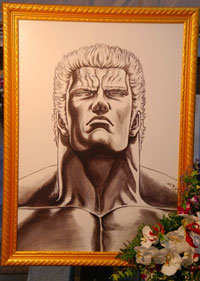Anyone who’s ever worked in a Japanese organization for any length of time probably knows the frustration of having a pet idea shot down by the larger organization around them. It’s a common occurrance here: a foreigner who naturally sees things through different eyes makes a heartfelt suggestion about something that can be improved, some new way of doing things that’s more efficient. Although the Japanese person listening to his idea will repeatedly use the phrase so desu ne which literally means “yes, that is so,” in reality the suggestion willusually not be deemed appropriate for the organization and the person be very politely rebuffed. After I finished my career as an ESL teacher, I worked for a few months in our local city office as the “facilitator for city internationalization” or something like that (basically, I was the bilingual person who could translate documents and help out other foreigners when they came in to use city services). During my brief time in the public sector I repeatedly ran across areas I felt could be managed better, but I was told “this is the way it’s done here” all too often. My wife and I are involved with Japan Girl Scouts — I’m the guy who brings interesting things from America for the girls, like the easter eggs we colored two weeks ago — and we recenty experienced this aspect of Japan while trying to explain the economics of Girl Scout Cookies to the local regional leaders. Our suggestion was to see what we could to do recreate the same experience — the girls of our troops selling something that both raises money for events as well as advertises the goals of the group to a wide range of people. Unfortunately we might as well have been speaking greek, and our ideas were rejected in record time. I’m not saying that my suggestions are always right, of course, only that there seems to some sort of inbred resistance to new ideas in many organizations in Japan.

One of the most popular pasttimes in Japan is pachinko, a kind of vertical pinball game that can be found in the more than 15,000 pachinko parlors here. A form of gambling, you basically buy $20 worth of steel balls from the counter then shoot them into the machine, holding your hand at just the right angle to make the balls fall into special holes that cause more balls to be paid out. If you do it right, you end up with more balls then you started with, which you “exchange” for “valuable” “prizes” that you can sell for cash at a separate building next door (since pachinko gambling for money is not actually legal). Our prefecture of Gunma happens to be a regular “pachinko central,” with most major manufacturers of the machines located here including Sankyo, who employs Nicholas Cage for its commercials. Sadly, pachinko often goes hand-in-hand with organized crime and the yakuza, and it hardly seems a month goes by withour hearing “the man arrested was the propeieter of a pachinko parlor” on TV. Then there’s the odd connection with pachinko and North Korea, with many pachinko-related businesses being operated by Japanese of North Korean descent, which leads through various mechanisms to profits being sent home to the mother country. Um, anyone else want to trade places with me? I like living in Japan, but being next door to North Korea is not really the most fun thing in the world…
As with any industry, the pachinko makers must evolve and change in order to keep its customers happy, and the pachinko industry has been quite smart about finding ways of attracting young blood into its establishments. One way they’ve found to keep the interest of customers in their twenties is by tying the game to popular anime shows, with pachinko machines branded with images and art from anime classics like Fist of the North Star, Lupin III, Golgo 13 and Evangelion. When a new Space Cruiser Yamato series by Leiji Matsumoto was cancelled due to lack of funding, it lived on in a line of pachinko machines that featured the newly designed characters and ships. Do you like the British rock group Queen? Come to Japan and play the Rock You Queen pachinko machines that Aruze has created. There’s even a pachinko machine for fans of the heart-rending Korean soap opera Winter Sonata, a smart move to improve the game’s image and get female customers in the door. But the coolest new trend in pachinko might be the new moé pachi (mo-EH PA-chi) in Akihabara, where attractive girls in gothic maid costumes will wait on you while you pour your buckets of metal balls into the machines.
At J-List, we live to bring you new and unique products from Japan, including rare Totoro and Studio Ghibli items. Every summer Japanese often use towelkets, a kind of giant towel that’s useful as a light summer blanket. I like towelkets because you can use them on hot summer nights to keep the heat at bay, and you can also take them to the pool, since they’re fully functional giant towels. Today we’ve got two cute new Totoro towelkets in stock, great items for collectors this season!















